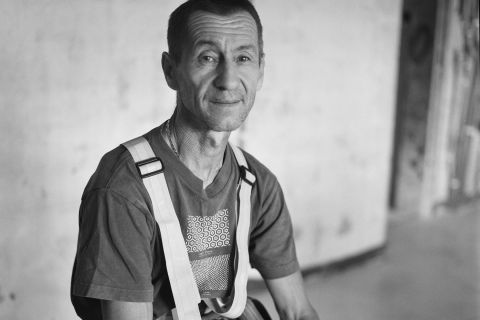Department of Photography
המחלקה לצילום
قسم التصوير
The Center for Photography and Human Rights
The center for Photography and Human Rights is an academic platform currently functioning digitally, with an anticipated physical center forthcoming. This initiative is devoted to the academic research of photographic visual imagery within the context of human and civil rights discourse. Presently, the center for Photography and Human Rights operates as a digital archive, collecting photographic works and projects that address socio-political matters within human and civil rights frameworks.
The center’s mission encompasses advancing scholarly research and educational initiatives in these domains while fostering interdisciplinary dialogue with artistic, cultural, media, and public spheres.
The Center for Photography and Human Rights aims to disseminate visual academic knowledge developed within Bezalel's Photography Department, facilitate substantive discourse regarding human rights issues, develop curricula, and enhance activist photographic practice for effecting social transformation. These objectives reflect a commitment to cultivating a generation of practitioners dedicated to principles of social justice and community engagement.
While human rights fundamentally constitute a legal domain, Israel's social landscape presents multifaceted challenges: despite advancements in human rights protections, regressive tendencies persist. Numerous demographic groups - including women, elderly populations, children, LGBTQ+ community members, refugees, migrant laborers, individuals with disabilities, and certain ethnic communities - continue to experience rights disparities and inadequate implementation of legally guaranteed protections.
Consequently, the photographic practice represents an activist methodology that documents and renders visible societal injustices, oriented toward their transformation.
**This initiative has been developed with Israel’s Ministry of Education support through the "Setting Points in Academia" program - an initiative integrating academic coursework into secondary education curricula to facilitate academic exposure, provide academic credit , and enhance social mobility among Israeli students
Human and Civil Rights
Human Rights
Human rights are universal principles that ensure dignity and equality for all people. These rights include civil, political, economic, social, and cultural freedoms. The Universal Declaration of Human Rights was adopted by the UN General Assembly in 1948 and is one of the key documents in shaping human rights concepts. The declaration establishes fundamental principles of equality, freedom, non-discrimination, and legal protection for all people, regardless of race, gender, religion, or national origin.
It includes civil and political rights, such as the right to life, the right to equality, personal security, freedom from oppression and torture, freedom of expression and protest, freedom of thought, conscience, and religion, as well as protection from torture. Alongside these, it also includes social and economic rights, such as the right to education, the right to work, the right to health, and more.
Civil Rights
Civil rights focus on protecting individuals from discrimination and promoting equality in areas such as employment, education, housing, and public services. These rights are often based on specific legislation that protects groups based on characteristics such as race, gender, or religion. It is important to distinguish between civil rights and civil liberties; civil liberties focus on protecting individual freedoms from government interference, such as freedom of speech or freedom of religion.
Human and Civil Rights in Israel
The issue of human rights in Israel is complex due to the country’s unique political and social context. Although there is a declarative commitment to democratic values for most citizens, significant gaps remain regarding minorities and the Palestinian population in the territories.
For example, Israel’s Declaration of Independence promises equality for all its citizens regardless of religion or race, but in practice, Arab citizens often face institutional discrimination in areas such as housing and employment. Additionally, human rights in the Palestinian territories under Israeli control are often not upheld. Palestinians living in the West Bank and Gaza Strip do not have voting rights in Israeli elections and face restrictions on freedom of movement and access to basic resources.
Furthermore, in terms of gender and ethnic representation, discrimination persists. Women and minorities face challenges related to discrimination and political representation.
Conclusion
The purpose of human and civil rights is to ensure dignity, equality, and freedom for every individual. In the Israeli context, the country’s Declaration of Independence reflects some of the principles established in the UN declaration, as it promises equal rights to all its citizens regardless of religion, race, or gender. However, in practice, there are gaps between these principles and their implementation, particularly regarding minority rights and the situation in the Palestinian territories. Additionally, in recent years, concerns about threats to democratic values and human rights have increased both globally and in Israel, with restrictions on freedom of expression and actions against civil society organizations.
Artists, lecturers, and graduates of the Department of Photography | Human and Civil Rights
Artists, lecturers from the Bezalel Department of Photography and its graduates discuss their work in relation to human and civil rights.
Photography: Yotam Kiper
Sound: Alon Balas
Editing: Lior Yeger



